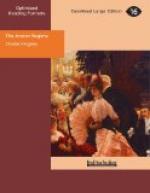Of that equestrian caste the symbol was the horse. The favourite, and therefore the chosen sacrifice of Odin, their ancestor and God, the horse’s flesh was eaten at the sacrificial meal; the horse’s head, hung on the ash in Odin’s wood, gave forth oracular responses. As Christianity came in, and the eating of horse-flesh was forbidden as impiety by the Church, while his oracles dwindled down to such as that which Falada’s dead head gives to the goose-girl in the German tale, the magic power of the horse figured only in ballads and legends: but his real power remained.
The art of riding became an hereditary and exclusive science—at last a pedantry, hampered by absurd etiquettes, and worse than useless traditions; but the power and right to ride remained on the whole the mark of the dominant caste. Terribly did they often abuse that special power. The faculty of making a horse carry him no more makes a man a good man, than the faculties of making money, making speeches, making books, or making a noise about public abuses. And of all ruffians, the worst, if history is to be trusted, is the ruffian on a horse; to whose brutality of mind is superadded the brute power of his beast. A ruffian on a horse—what is there that he will not ride over, and ride on, careless and proud of his own shame? When the ancient chivalry of France descended to that level, or rather delegated their functions to mercenaries of that level—when the knightly hosts who fought before Jerusalem allowed themselves to be superseded by the dragoons and dragonnades of Louis XIV.—then the end of the French chivalry was at hand, and came. But centuries before that shameful fall there had come in with Christianity the new thought, that domination meant responsibility; that responsibility demanded virtue. The words which denoted rank, came to denote likewise high moral excellencies. The nobilis, or man who was known, and therefore subject to public opinion, was bound to behave nobly. The gentleman—gentile-man—who respected his own gens, or family and pedigree, was bound to be gentle. The courtier, who had picked up at court some touch of Roman civilisation from Roman ecclesiastics, was bound to be courteous. He who held an “honour” or “edel” of land was bound to be honourable; and he who held a “weorthig,” or worthy, thereof, was bound himself to be worthy. In like wise, he who had the right to ride a horse, was expected to be chivalrous in all matters befitting the hereditary ruler, who owed a sacred debt to a long line of forefathers, as well as to the state in which he dwelt; all dignity, courtesy, purity, self-restraint, devotion—such as they were understood in those rough days—centred themselves round the idea of the rider as the attributes of the man whose supposed duty, as well as his supposed right, was to govern his fellow-men, by example, as well as by law and force;—attributes which gathered themselves up into that one word—Chivalry: an idea, which, perfect or imperfect, God forbid that mankind should ever forget, till it has become the possession—as it is the God-given right—of the poorest slave that ever trudged on foot; and every collier-lad shall have become—as some of those Barnsley men proved but the other day they had become already:




